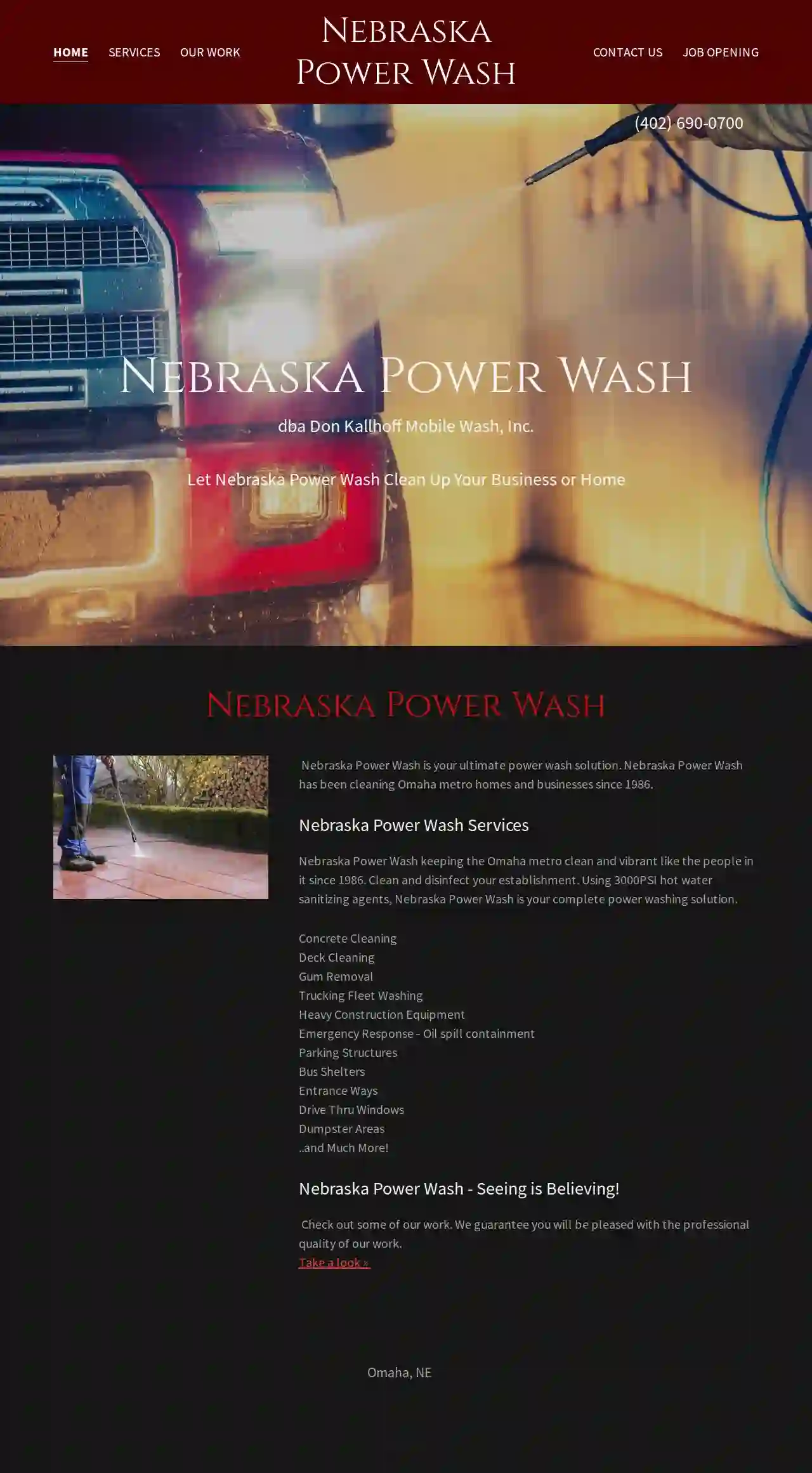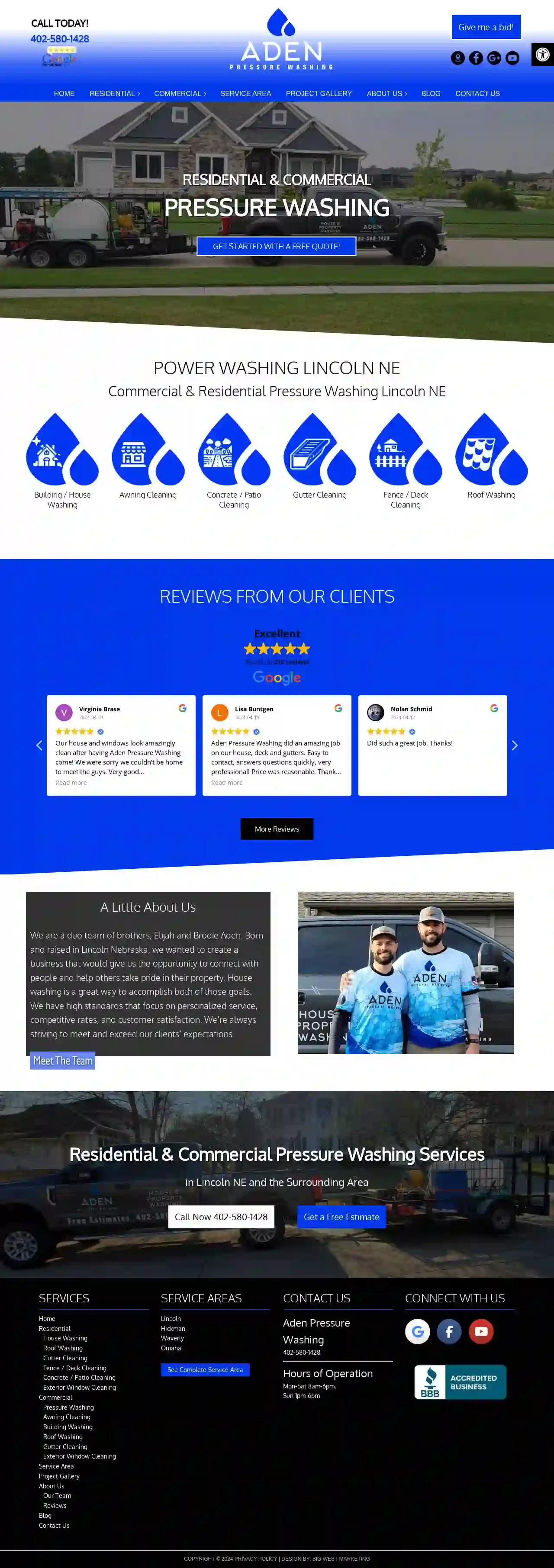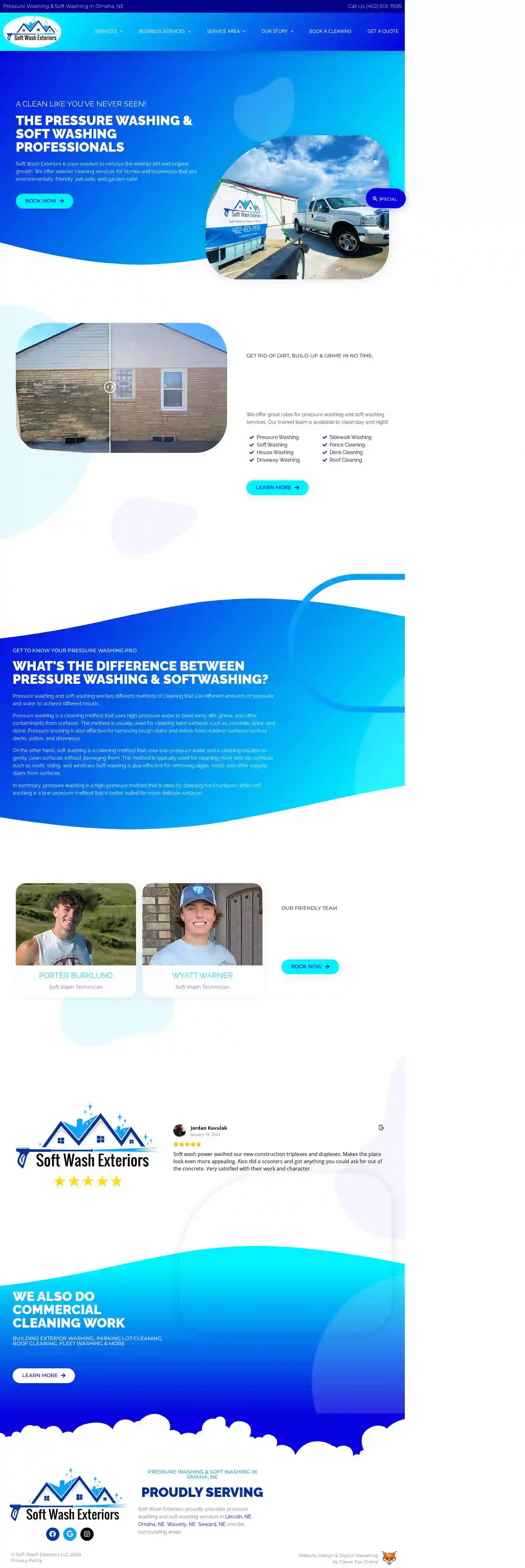Pressure Washing Schuyler
Best Power Washing in Schuyler
Receive 3 FREE Driveway Cleaning quotes for your project today! Compare profiles, reviews, accreditations, portfolio, etc... and choose the best deal.

Nebraska Power Wash
41 reviews6116 O St, Omaha, 68117, USNebraska Power Wash is your ultimate power wash solution. Nebraska Power Wash has been cleaning Omaha metro homes and businesses since 1986. We guarantee you will be pleased with the professional quality of our work.
- Services
- Why Us?
- Gallery
Get Quote
Modern Pressure Washing
513 reviews11531 Portal Rd Suite 16, La Vista, 68128, USAt Modern Pressure Washing, we're passionate about helping our customers keep their properties looking their best. From commercial buildings to residential homes, we've got the tools and expertise to tackle even the toughest cleaning challenges. We pride ourselves on our attention to detail, our commitment to customer satisfaction, and our dedication to using the latest equipment and techniques to achieve the best possible results. When you choose Modern Pressure Washing, you're choosing a team that will go above and beyond to exceed your expectations.
- Services
- Why Us?
- Gallery
Get Quote
Omaha Spray Pressure Washing
51 reviewsOmaha NE, Omaha, USWelcome to Omaha Spray, offering pressure washing services throughout the Omaha Metro area. Jack Filips, the owner and operator, has been in the pressure washing business since 2017, working his way through high school and college. With 5+ years of experience, he handles everything from houses to patio furniture. Omaha Spray is focused on getting the job done right, in a timely manner, and for a reasonable price. They specialize in residential and light commercial work and are fully insured. Free estimates are offered on all jobs, regardless of size.
- Services
- Why Us?
- Our Team
- Gallery
Get Quote
Aden Pressure Washing
5202 reviewsLincoln, USYour Satisfaction Is Our Priority! At Aden Pressure Washing, we have high standards that focus on personalized service, competitive rates, and customer satisfaction. Reach out to learn more about our professional pressure washing services in Lincoln and the surrounding area.
- Services
- Why Us?
- Accreditations
- Our Team
- Testimonials
- Gallery
Get Quote
Eagle Exterior Cleaning
517 reviewsOmaha, 68144, USWelcome to Eagle Exterior Cleaning, your trusted source for pressure washing in Omaha. Our commitment to integrity, exceptional customer service, and expert craftsmanship has made us a leader in the industry. At Eagle Exterior Cleaning, we take great pride in our team’s professionalism and skill. Each member of our pressure washing crew undergoes extensive training. This ensures that when we step onto your property, we’re equipped to meet your expectations without compromising the safety of your surroundings. Our state-of-the-art equipment, combined with cutting-edge techniques, allows us to deliver a pressure washing service that effectively removes harmful organic growths and revitalizes your property. This not only protects your investment but also enhances curb appeal and increases property value. Choose Eagle Exterior Cleaning for a pressure washing solution that guarantees satisfaction and delivers results that make your property stand out. Let us help you maintain the beauty and longevity of your exterior with our professional cleaning services. We’re proud members of the West Omaha Chamber of Commerce
- Services
- Why Us?
- Accreditations
- Our Team
- Testimonials
- Gallery
Get Quote
Rathjen Power Washing
55 reviewsGrand Island, 68803, USRathjen Power Washing is a professional pressure washing and window cleaning contractor serving Grand Island, Hastings, Kearney, and throughout the Tri-City areas. We are a locally owned and operated residential and commercial pressure washing, house washing, window washing, and roof cleaning service focused on safety, quality, budget, and schedule. We offer a variety of additional exterior cleaning services including gutter cleaning and concrete surface cleaning. We are fully licensed, insured and guarantee all our work. Our customers can assure our crew is professional, knowledgeable and provides exceptional workmanship for every exterior cleaning project. We bring our industry experience to each and every pressure washing project. Whether you're looking to finish a minor job or starting to plan a major project, our knowledgeable team has the skills and tools to make sure the job is done right and to leave you with a solution that you'll be proud to put to use. We continue to build our reputation for personalized service and quality solutions with each and every client. We are dedicated to offering flexible solutions that work for you while also providing consistent results that meet our standards. Our team is large enough to deliver professional exterior cleaning solutions while offering the personal touches that ensure you meet your goals and exceed your expectations.
- Services
- Why Us?
- Our Team
- Gallery
Get Quote
Soft Wash Exteriors
4.54 reviews12345 Main Street, Suite 100, Tampa, 33619, USSoftWash EX is a leading provider of professional soft washing services in the greater Tampa Bay area. We specialize in gently cleaning a variety of surfaces using low-pressure water and environmentally friendly cleaning solutions. Our services are designed to remove dirt, grime, mold, mildew, and algae without damaging your property. We are committed to providing our clients with exceptional service, quality workmanship, and competitive pricing. At SoftWash EX, we understand the importance of maintaining the beauty and value of your home or business. That's why we use the latest soft washing techniques and equipment to ensure a thorough and effective clean. Our team of experienced professionals is dedicated to providing you with a safe and reliable service that will exceed your expectations. Whether you need your roof, siding, driveway, deck, or other surfaces cleaned, SoftWash EX has the expertise and equipment to get the job done right. Contact us today for a free estimate and let us help you keep your property looking its best.
- Services
- Why Us?
Get Quote
Under Pressure Pressure Washing LLC
575 reviewsOmaha, USUnder Pressure Pressure Washing is a family owned business serving the Omaha area. We take pride in our work and strive to ensure every customer is happy with our service. With over 10 years of experience in the field, our team is trained and certified, and we regularly attend workshops to stay up-to-date on the latest techniques. We are fully insured and committed to providing a seamless cleaning experience for our clients.
- Services
- Why Us?
- Our Team
- Testimonials
- Gallery
Get Quote
B&B Power Clean
515 reviewsLincoln City, 97367, USWe at B&B Power Clean are proud to be the best pressure washing company in Lincoln City. Since we first started serving customers in the area, they have come to expect nothing less than top-notch service from every member of our team. We are confident that you won't find a pressure washing company superior to B&B Power Clean. We are the best in the industry. Our office staff is known for being friendly, welcoming, and adaptable, helping you find a plan that fits your budget and schedule. Our team of pressure washing experts understands pressure washing and what it takes to make your property look its best. If you need your property in Lincoln City to look its best, choose our pressure washing company. We serve the following cities: * Lincoln City * Newport * Pacific City If you live near Lincoln City but don't see your city listed, please don't hesitate to contact us to see if we can help. At B&B Power Clean, we stand behind our work with a 100% satisfaction guarantee. We will come back to your property as many times as needed until you are completely satisfied with the results. This means you can be confident that you will get the results you desire without any risk. We also offer a wide range of services, including window cleaning and boat cleaning, so you can use us as your one-stop shop for all your exterior cleaning needs. Our Core Washing Services: * House Washing * Roof Cleaning * Gutter Cleaning & Brightening * Window Cleaning * RV Cleaning * Boat Cleaning * Sidewalk Cleaning * Driveway Washing * Commercial Pressure Washing
- Services
- Why Us?
- Accreditations
- Our Team
- Testimonials
- Gallery
Get Quote
Lincoln Park Power Washing Pros
51 reviewsLincoln, USLincoln Park Power Washing Pros is a locally owned and operated business serving Lincoln Park and surrounding areas for over 20 years. We specialize in providing reliable, affordable, and high-quality soft wash pressure washing services for both residential and commercial properties. Our team of experienced professionals takes pride in delivering exceptional customer service and customized cleaning plans to meet your specific needs and budget. We utilize the latest equipment and techniques to ensure thorough cleaning without damaging your surfaces. Whether you need your house siding, roof, pavers, or other exterior surfaces cleaned, Lincoln Park Power Washing Pros is your trusted partner for a sparkling clean and healthy property.
- Services
- Why Us?
- Accreditations
- Testimonials
- Gallery
Get Quote
Over 60,241+ Janitorial Contractors on our platform
Our janitorial pros operate in Schuyler & surrounding areas!
CleaningMatch has curated and vetted the Best Cleaning Companies arround Schuyler. Find a top & trustworthy contractor today.
Frequently Asked Questions About Pressure Washing
- Regular Cleaning: Sweep or rinse surfaces regularly to prevent dirt and grime from building up.
- Address Stains Promptly: Clean up spills or stains as soon as possible to prevent them from setting in.
- Trim Vegetation: Keep trees and shrubs trimmed away from surfaces to minimize shade, which can promote mold and mildew growth.
- Apply Protective Coatings: Consider applying protective sealants or coatings to surfaces like decks or fences to repel water and dirt, extending their lifespan and maintaining their appearance.
- Schedule Periodic Pressure Washing: Schedule periodic professional pressure washing to maintain the cleanliness and appearance of your surfaces over time.
- Size of the Area: Larger areas generally cost more to pressure wash than smaller ones.
- Type of Surface: Different surfaces require different pressure levels and cleaning solutions, which can affect pricing.
- Condition of the Surface: Heavily soiled or stained surfaces may require more time and effort to clean, impacting cost.
- Accessibility: Difficult-to-reach areas may require specialized equipment and increase costs.
- Additional Services: Services like pre-treating stains, applying protective coatings, or mold removal may incur additional charges.
- Pressure Washing: If your siding is in good condition but dirty or stained, pressure washing can effectively restore its appearance without the need for painting.
- Painting: If your siding is faded, chipped, peeling, or damaged, pressure washing alone may not be sufficient. Painting provides a fresh coat of protection and a new look.
- Pressure Washing Before Painting: Pressure washing is an essential step before painting, as it removes dirt, grime, and loose paint, creating a clean surface for the new paint to adhere to.
- 0-degree Nozzle: Produces a highly concentrated, powerful jet of water for removing stubborn stains or stripping paint. Use with caution as it can damage surfaces easily.
- 15-degree Nozzle: A versatile nozzle for cleaning concrete, brick, and other hard surfaces. Provides a good balance of pressure and coverage.
- 25-degree Nozzle: A wider spray pattern for cleaning delicate surfaces like siding or fences.
- 40-degree Nozzle: A very wide spray pattern, ideal for rinsing or applying cleaning solutions.
- Soap Nozzle: A low-pressure nozzle designed specifically for applying cleaning solutions.
- Rotary Nozzle: Also known as a turbo nozzle, it produces a rotating, high-impact spray for tackling tough stains and grime.
What are some tips for maintaining my pressure washed surfaces?
By implementing these maintenance practices, you can prolong the results of your pressure washing and keep your surfaces looking their best.
How much does pressure washing cost?
To get accurate pricing, request quotes from multiple pressure washing companies. Provide details about the size and type of surface, its condition, and any additional services you require.
Is it better to pressure wash or paint my house?
Assess the condition of your siding and your desired outcome to determine whether pressure washing, painting, or a combination of both is the best approach.
What are the different types of pressure washer nozzles?
Choose the appropriate nozzle based on the cleaning task and the type of surface being cleaned. Consult the pressure washer manual or a professional pressure washer for guidance.
What are some tips for maintaining my pressure washed surfaces?
- Regular Cleaning: Sweep or rinse surfaces regularly to prevent dirt and grime from building up.
- Address Stains Promptly: Clean up spills or stains as soon as possible to prevent them from setting in.
- Trim Vegetation: Keep trees and shrubs trimmed away from surfaces to minimize shade, which can promote mold and mildew growth.
- Apply Protective Coatings: Consider applying protective sealants or coatings to surfaces like decks or fences to repel water and dirt, extending their lifespan and maintaining their appearance.
- Schedule Periodic Pressure Washing: Schedule periodic professional pressure washing to maintain the cleanliness and appearance of your surfaces over time.
By implementing these maintenance practices, you can prolong the results of your pressure washing and keep your surfaces looking their best.
How much does pressure washing cost?
- Size of the Area: Larger areas generally cost more to pressure wash than smaller ones.
- Type of Surface: Different surfaces require different pressure levels and cleaning solutions, which can affect pricing.
- Condition of the Surface: Heavily soiled or stained surfaces may require more time and effort to clean, impacting cost.
- Accessibility: Difficult-to-reach areas may require specialized equipment and increase costs.
- Additional Services: Services like pre-treating stains, applying protective coatings, or mold removal may incur additional charges.
To get accurate pricing, request quotes from multiple pressure washing companies. Provide details about the size and type of surface, its condition, and any additional services you require.
Is it better to pressure wash or paint my house?
- Pressure Washing: If your siding is in good condition but dirty or stained, pressure washing can effectively restore its appearance without the need for painting.
- Painting: If your siding is faded, chipped, peeling, or damaged, pressure washing alone may not be sufficient. Painting provides a fresh coat of protection and a new look.
- Pressure Washing Before Painting: Pressure washing is an essential step before painting, as it removes dirt, grime, and loose paint, creating a clean surface for the new paint to adhere to.
Assess the condition of your siding and your desired outcome to determine whether pressure washing, painting, or a combination of both is the best approach.
What are the different types of pressure washer nozzles?
- 0-degree Nozzle: Produces a highly concentrated, powerful jet of water for removing stubborn stains or stripping paint. Use with caution as it can damage surfaces easily.
- 15-degree Nozzle: A versatile nozzle for cleaning concrete, brick, and other hard surfaces. Provides a good balance of pressure and coverage.
- 25-degree Nozzle: A wider spray pattern for cleaning delicate surfaces like siding or fences.
- 40-degree Nozzle: A very wide spray pattern, ideal for rinsing or applying cleaning solutions.
- Soap Nozzle: A low-pressure nozzle designed specifically for applying cleaning solutions.
- Rotary Nozzle: Also known as a turbo nozzle, it produces a rotating, high-impact spray for tackling tough stains and grime.
Choose the appropriate nozzle based on the cleaning task and the type of surface being cleaned. Consult the pressure washer manual or a professional pressure washer for guidance.